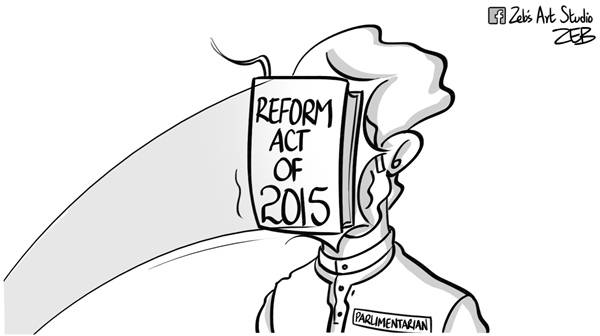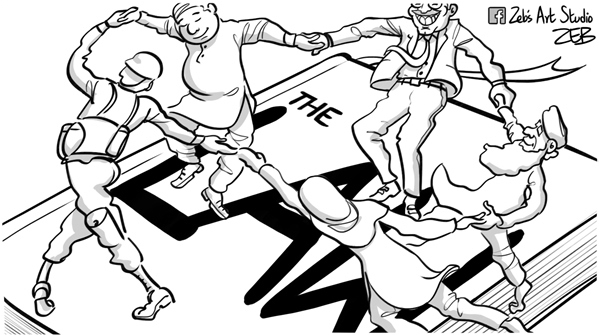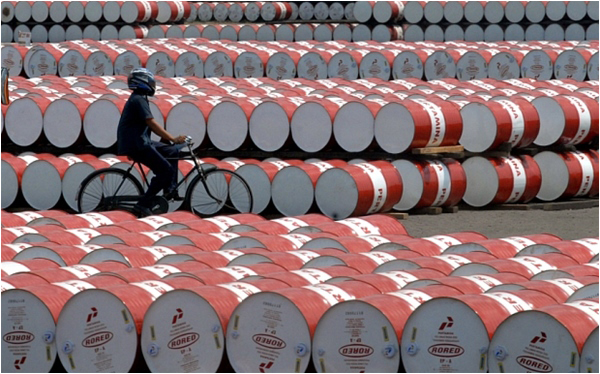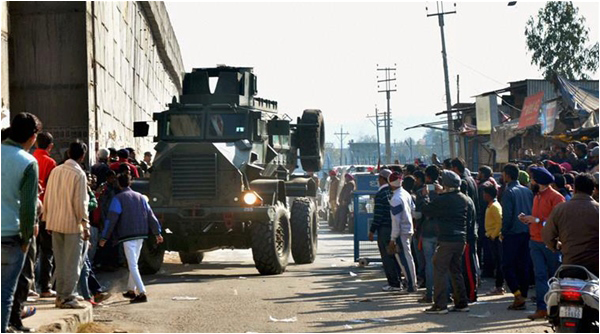
Necessary reforms
Sir,
For far too long have we the people complained that our parliamentarians live a life that reflects how disconnected they are with the masses. They wine and dine so to speak while thousands around the country die of hunger and starvation. Keeping that in mind, there is an urgent need to introduce a reform act in parliament, one that sets down such rules for our parliamentarians that they will be forced to live like the common folk and in turn be more empathetic towards their problems.
The first rule should be that parliamentarians be allowed to collect a salary while in office, but should not receive any pay when they’re out of office or have retired.
Also, parliamentarians should purchase their own retirement plans, just as all Pakistanis do with life insurance etc. Next, parliamentarians should no longer vote for themselves a pay raise. Their pay should be linked to the CPI or 3%, whichever is lower. Parliamentarians should lose their current healthcare system (foreign countries medical treatment) and participate in the same healthcare system as the Pakistani people. Parliamentarians with tainted records, criminal charges and convictions, past or present, should be summarily banned from parliament and from contesting elections on any pretext or the other. Parliamentarians should equally abide by all the laws they impose on the Pakistani people. Next contracts with past and present parliamentarians should be void effective 1/1/15 .The Pakistani people did not make this contract with them. Parliamentarians made all these contracts for themselves. Serving in Parliament is an honor, not a lucrative career. The founding fathers envisioned citizen legislators, so ours should serve their term(s), then go home and not rule over us like monarchs. The last reform needed is that people should not surrender subsidies like LPG unless all subsidies available to MPAs and MNAs are withdrawn, including subsidised food in the Parliament canteen, and free accommodation in the parliamentary lodges.
Zeeshan Shah,
Lahore.

DHA Lahore controversy
Sir,
Reference retired Brigadier Amjad Kayani’s unconvincing arguments on numerous channels, the decision by General Raheel Sharif to prosecute corrupt khaki officers involved in irregular activities will restore the army’s prestige and dignity. It is too important an institution to be made hostage to the greed of a few within its ranks. They owe it to thousands of valiant soldiers who offered the supreme sacrifice. The universally accepted code of morals and ethics for men of honor, such as the principle of conflict of interest, have been trampled on by likes of Kamran Kiyani and a few members of this family. They should have given thought to prevent a blowback of their conducting a real estate business within cantonments, especially DHA. Is it mere coincidence that huge construction contracts were awarded to them during the tenure of their brother, while he held important assignments? This abuse has become very profound by those holding important paid or elected public offices in this country, where corruption has become so rampant, that it has eroded our moral values and harmed our economy.
Political and paid public offices, which are voluntarily acquired with an oath to uphold the constitution in letter and spirit, have been reduced to instruments for abuse by submitting to insatiable greed for money and assets. DHA, which was established as a welfare housing society for the next of kin of martyrs and injured ghazis, has become a commercial venture often tainted with controversies, ever since Musharraf introduced a points system for multiple plot allotments to individuals who retired unhurt after gainful employment with perks and pensions. It was during his tenure that the “File System” was introduced, and plots existed only on paper, with no sufficient physical acquisition of land by DHA becoming a scam involving a former officer nicknamed Zar-Zameen. This irregularity should have been nipped in the bud, instead of being regularised with disastrous consequences, such as DHA Lahore expanding into what constituted almost our second line of defense in 1965, should have raised alarm bells. The controversy involving DHA Valley Islamabad’s allotment of plots for the general public is unacceptable and the culprits responsible must be punished.
Ali Malik Tariq,
Lahore.

Exigency of a mediatory posture
Sir,
At its very outset, the year 2016 has unleashed the long-held fears of the global community over the gravity of the Saudi Arabia-Iran conflict that has now transited from an age-old proxy war into a direct diplomatic standoff. Barely two days into the New Year, Saudi Arabia’s decision to execute the eminent Shiite cleric Nimr-al-Nimr along with 46 individuals charged with terrorism and incitement was impolitic to say the least.
According to wide held beliefs, the Sheikh’s notoriety for the House of Saud was a result of his blatant and candid criticism of the Saudi government, emanating from the violation of Shiite rights in KSA, something that has eminently been defining the status quo in KSA since ages. It is ironic to note that though the charges on which Sheikh Nimr was executed were that of terrorism and incitement, he was the focal person who abstained his followers from resorting to flagrant practices in 2012, when Shiites protested against the Saud regime. For the Sheikh believed that “the roar of the word” was far more potent in contrast to the practices of belligerency and violence, aimed at making one’s grievances heard.
As was anticipated, the execution of the Shiite cleric, precipitated widespread dissent among the Shiite population of the Muslim world. Kicking off from the torching of the Saudi embassy in Tehran, to the expulsion of Iranian diplomats from KSA and finally to the generation of a diplomatic impasse, the grave chain of incidents has dashed to the ground any hopes of peace or understanding between the two states. The status quo presents a challenging situation. The Saudi-Iran impasse that has escalated to unprecedented heights is not only ringing danger bells for the socio-political dynamics of the Middle East but also threatening the peace of the global society. The resolution of the conflict has assumed contours of incontrovertibility, something that needs to be done, and done immediately, without any further delay. If left unaddressed, the conflict will not only usher in an era of uncontrolled sectarian schism, necessitate the pervasion of gory terrorist attacks, but also stigmatise Muslims and harden anti-Muslim stances in the minds of non-Muslims.
Under the harrowing circumstances, the exigency of a mediatory posture can usher the de-escalation of the conflict to tolerable limits, allowing KSA and Iran to resolve their differences towards the generation of a considerably peaceful ambiance. The use of mediation in conflict resolution is surely not a new phenomenon. The earliest instance of mediation as a tool in resolving conflict can be traced back to 209BC when Greek city-states assisted the Aetolian League and Macedonia to produce a truce in the first Macedonian War. Since then, countless instances dotting the world history can be traced where mediation, be it of individuals, states or international organisations has effectively resolved conflicts.
In the diplomatic standoff between KSA and Iran, state level mediation under the umbrella of an international organisation is necessitated. International organisations like the UNO have a little chance of success in the resolution of this conflict due to the eminent religious contours shading the conflict, which can best be understood by an organisation with an Islamic orientation and definition. An organisation that comes up to these standards is the OIC, which is in fact the second largest international organisation with 57 member states and a representation matrix of 1.6 billion Muslims. It has a greater plausibility of success in conflict resolution due to its past history of curbing the Sunni-Shia schism to tolerable limits, which was defining Iraq following 2003.
The development of a mediatory posture is in the best interests of Pakistan. Forgoing impartiality and aligning either with Iran or with KSA is not a choice that Pakistan can afford to make. Alignment with Iran would mean breaching the trust of KSA, a state with whom Pakistan has ‘brotherly ties’ since long. On the other hand, aligning with KSA would incessantly call for the invitation of tensions with neighborly Iran, something that Pakistan cannot afford to bear since it is already engaged in dealing with conundrums on the Eastern border with India, and on the Western border with Afghanistan. Moreover, siding with any of the two parties is going to brew sectarian rife in Pakistan, a country that has of 2015 seen a 7% increase in sectarian attacks compared to preceding years. The recurrent attacks on Hazaras in Quetta or on Shiite population elsewhere by Sunni militant groups are a manifestation of this grave fact.
Under these circumstances, Pakistan joining the 34 nation military alliance of Muslim countries headed by KSA against terrorism, an alliance of which Iran is not a member, raises eyebrows over the nature of the alliance and the ambiguity of Pakistan’s position in the conflict. Though it has been reiterated by Sartaj Aziz that Pakistan’s position in the conflict is a neutral one, yet doubts still pervade various political and social quarters in Pakistan. The only panacea for Pakistan under the testing crisis is to mediate peace between Iran and KSA by cajoling them to come together for reconciliatory talks since Pakistan’s partial status in the conflict would only propel sectarian schism at home, a recourse that threatens the security of the state.
Marria Qibtia
SIkandar Nagra,
Islamabad.

Pathankot airbase attack
Sir,
A heavily armed group of terrorists attacked the Pathankot Airbase of the Western Air Command of the Indian Air Force on January 2, 2016. The attackers, said to be six in numbers, and three security forces personnel were reportedly killed in the initial battle. The intense gun battle and the subsequent combing operation lasted for about 17 hours on January 2. The attackers, reportedly wearing Indian Army battledress, were suspected to belong to Jaish-e-Muhammad, a militant group designated as a terrorist organisation by India, the United States, the United Kingdom and the United Nations.
Indian and foreign media portrayed the attack as a terrorist act. Media reports suggested that the attack was an attempt to derail the fragile peace process rejuvenated recently to bring about improvement in the volatile bilateral relations between India and Pakistan. As known to all and sundry in the region and the west, signs of thaw in the deteriorating bilateral India-Pakistan relations could be seen after the momentary encounter between the prime ministers of India and Pakistan on the sidelines of the World Climate Conference in Paris and the unscheduled meeting of the security advisers of the two countries in Bangkok. Messages of cordiality and the urge to resume the stalled bilateral talks between the two countries emanating from the above two meetings ultimately broke the ice with the arrival of Sushma Swaraj, India’s External Affairs Minister, in Islamabad to attend the ‘Heart of Asia Conference’ on December 9, 2015. Much to the pleasure and surprise of people on both sides of the divide, she announced the resumption of the stalled composite bilateral dialogue between India and Pakistan.
The decision of the two belligerent neighbors of the region to resume the long-stalled bilateral composite dialogue was taken on a positive note by people on both sides of the divide. The countries of the region and the international community too received this positive development in the embittered relations between India and Pakistan warmly. Unfortunately, however, it seems that the exuberance vis-à-vis India–Pakistan relations was not meant to last long. The terrorist attack on the Pathankot Airbase in India on January 2/16 seems to seriously threaten the nascent India-Pakistan rapprochement.
Unambiguously, the establishment of cordial bilateral relations between India and Pakistan is the need of the hour. In fact, it holds the key to peace and progress not only between the two countries but the entire region. Both countries, India in particular, must appreciate the importance of congenial relationship between them. India must not take a stance that would potentially threaten the initiatives recently taken by it to improve its relations with Pakistan. It must act cautiously and sensibly, particularly in dealing with contemptuous issues such as the Pathankot Airbase attack of January 2, 2016, to ensure that the positive initiative taken to resume the long-stalled composite dialogue between the two countries does not wither away yet again.
So far it seems both India and Pakistan have acted on the Pathankot issue with a sense of responsibility. At least the recent statement of India’s Home Minister, Rajnath Singh, that there was no reason to distrust Pakistan’s assurance of an “effective action” against those linked to the terror attack on the IAF base in Pathankot, and that India should wait for Pakistan’s action vis-à-vis the issue emanates a glimmer of hope that both sides will genuinely endeavor to redress the problem amicably in their own interest and in the larger interest of the region. By arresting the supremo of the banned Jaish-e-Muhammad (JeM), Maulana Masood Azhar, his brother Maulana Rauf Azhar and some of his followers and closing down the organisation’s offices in Pakistan, Islamabad has amply proved its seriousness to respond positively to India’s request for identifying and bringing to book the perpetrators of the Pathankot Airbase attack.
Elahi Fazal,
Islamabad.

Education suffering
Sir,
The apathy of the Federal Directorate of Education towards Islamabad model schools and colleges has become a major concern for parents. Pay-deprived teachers are painstakingly dejected and naturally, therefore, are not interested at all in fulfilling their primary responsibility of teaching. Their neglect and disinterest in teaching is causing serious harm to students, who for no fault of theirs, have to bear the brunt of the indifference of the relevant authorities towards this grave issue.
Nawaz Sharif has taken the onus of upgrading the deteriorating standards of model schools and colleges of the capital on his own shoulders. He is being supported by his daughter Mariam Nawaz in the attainment of this vital objective. Minister of State for Capital Administration and Development Division (CA & DD) Dr Tariq Fazal Chaudhary has also recently rolled out an ambitious plan, obviously under the directive of the PM, to uplift the capital schools both in terms of education standards and infrastructure.
All this sounds good and must happen. But what puts a shadow of doubt on the fruition of the government’s plan vis-à-vis uplift of the capital schools is the demotivating factor that currently hounds teachers of public schools due to nonpayment of salaries. A glaring example of this fact is the Islamabad Model College for Girls F-10/2, where it is believed teachers have not been paid their salaries for a long period of time.
Will those at the helm in the government take immediate notice of this grave issue and expeditiously resolve it in the larger interest of suffering students and their overly concerned parents? Will the PM be kind enough to issue directives to relevant government bodies to resolve the matter on war footing?
M Fazal Elahi,
Islamabad.

